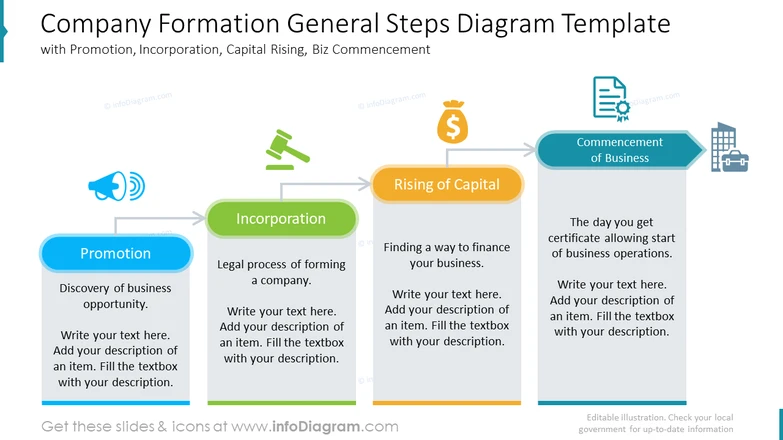Key Functions of the Commercial Registration Electronic System for Streamlined Company Formation
Key Functions of the Commercial Registration Electronic System for Streamlined Company Formation
Blog Article
Navigating the Complex World of Business Development: Insights and Techniques
Starting the journey of establishing a company can be a daunting task, specifically in a landscape where policies are continuously progressing, and the stakes are high. As entrepreneurs established out to navigate the elaborate globe of firm formation, it ends up being critical to gear up oneself with a deep understanding of the complex nuances that specify the procedure. From selecting the most appropriate organization structure to making certain stringent legal conformity and designing reliable tax obligation preparation strategies, the course to creating a successful business entity is filled with complexities. By deciphering the layers of complexities and leveraging insightful approaches, entrepreneurs can pave the way for a solid foundation that establishes the phase for future development and sustainability.
Organization Framework Choice
In the realm of firm development, the crucial decision of choosing the suitable business framework lays the foundation for the entity's functional and lawful structure. The choice of business structure dramatically impacts different aspects of the company, consisting of taxes, obligation, management control, and conformity demands. Business owners have to thoroughly assess the available choices, such as single proprietorship, partnership, limited obligation business (LLC), or firm, to establish one of the most ideal framework that straightens with their organization objectives and scenarios.
One common framework is the single proprietorship, where the company and the owner are thought about the same legal entity - company formation. This simplicity enables convenience of formation and complete control by the owner; nevertheless, it additionally requires limitless individual liability and prospective obstacles in raising resources. Partnerships, on the various other hand, involve two or even more people sharing profits and losses. While partnerships provide common decision-making and source merging, partners are personally accountable for the business's financial obligations and commitments. Understanding the subtleties of each organization framework is vital in making a notified decision that establishes a strong foundation for the firm's future success.
Lawful Conformity Fundamentals
With the structure of an appropriate organization framework in area, ensuring legal compliance essentials becomes paramount for safeguarding the entity's operations and preserving governing adherence. Lawful compliance is vital for business to operate within the borders of the regulation and stay clear of lawful problems or potential fines. Trick legal conformity basics consist of obtaining the necessary authorizations and licenses, sticking to tax obligation regulations, executing proper information defense procedures, and complying with labor laws. Failing to adhere to legal requirements can cause penalties, legal actions, reputational damages, or perhaps the closure of the business.
To make certain lawful compliance, companies must frequently examine and upgrade their plans and treatments to reflect any modifications in guidelines. Seeking legal advice or compliance experts can further help companies navigate the complex legal landscape and stay up to date with progressing guidelines.
Tax Obligation Planning Factors To Consider

Furthermore, tax obligation preparation need to incorporate strategies to benefit from readily available tax reductions, motivations, and credit scores. By strategically timing revenue and expenditures, businesses can potentially decrease their taxed earnings and general tax worry. It is additionally critical to remain notified about changes in tax regulations that might affect the business, adjusting techniques accordingly to continue to be tax-efficient.
In addition, worldwide tax preparation considerations may arise for organizations operating across boundaries, involving complexities such as transfer rates and foreign tax obligation credit scores - company formation. Looking for advice from tax professionals can aid browse these intricacies and create a comprehensive tax obligation plan customized to the business's demands
Strategic Financial Administration
Purposefully handling finances is an essential aspect of steering a business in the direction of sustainable growth and official statement profitability. Efficient economic administration includes an extensive method to managing a firm's monetary resources, financial investments, and total financial wellness. One crucial component of tactical monetary administration is budgeting. By producing thorough budgets that align with the firm's purposes and objectives, companies can allot sources successfully and track performance against monetary targets.

Monitoring cash money inflows and outflows, managing operating funding effectively, and making sure enough liquidity are necessary for the day-to-day procedures and long-term viability of a business. By identifying economic dangers such as market volatility, credit scores Look At This dangers, or regulatory adjustments, companies can proactively apply steps to guard their monetary security.
Furthermore, economic reporting and evaluation play a vital function in strategic decision-making. By creating precise financial records and conducting thorough analysis, services can obtain important understandings into their monetary efficiency, recognize areas for enhancement, and make educated tactical options that drive lasting development and success.
Development and Growth Approaches
To push a firm in the direction of enhanced market existence and success, critical development and expansion techniques need to be diligently devised and implemented. One reliable strategy for growth is diversification, where a business gets in brand-new markets or deals brand-new products or services to capitalize and minimize dangers on arising possibilities. An additional strategy is market infiltration, concentrating on boosting market show to existing items in present markets with hostile advertising or rates strategies. Additionally, strategic partnerships or collaborations with various other organizations can offer access to brand-new resources, modern technologies, or markets that speed up development. Mergers and acquisitions can be calculated for expanding market reach, obtaining affordable benefits, or getting vital ability. It is crucial for companies to conduct complete market research, monetary analysis, and danger analyses prior to starting any growth technique to ensure sustainability and success. By carefully implementing and preparing development methods, companies can navigate the complexities of development while Full Report optimizing worth for stakeholders.

Final Thought
In final thought, browsing the complexities of business development requires mindful consideration of service structure, legal compliance, tax planning, monetary management, and development methods. By purposefully selecting the appropriate organization structure, making sure lawful conformity, preparing for taxes, managing finances efficiently, and carrying out growth strategies, companies can establish themselves up for success in the competitive organization environment. It is essential for companies to come close to business formation with a tactical and detailed state of mind to achieve long-lasting success.
In the world of business development, the vital choice of choosing the ideal organization structure lays the structure for the entity's legal and operational structure. Business owners must very carefully evaluate the available choices, such as single proprietorship, collaboration, limited responsibility business (LLC), or company, to establish the most suitable structure that lines up with their service objectives and scenarios.
By developing detailed budgets that line up with the business's objectives and purposes, organizations can allocate resources efficiently and track performance against monetary targets.
In final thought, navigating the complexities of business development calls for mindful consideration of business structure, legal compliance, tax planning, financial management, and development strategies. By purposefully selecting the right business framework, ensuring lawful conformity, preparing for taxes, managing funds properly, and applying development methods, business can set themselves up for success in the competitive company environment.
Report this page